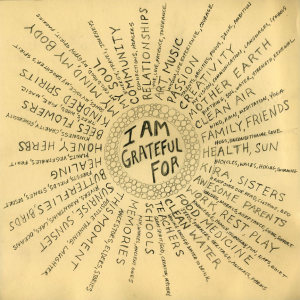As a financial counselor, I have always felt there is a strong correlation between a grateful attitude and financial health. In fact, I have taught students for years that one of the first steps to financial health is being grateful for what we presently have.
I was recently shocked to find out that a $3 million grant funded a study that was all about “gratitude.” This study was conducted by Dr. Robert Emmons, Professor of Psychology at the University of California in Davis.
Dr. Emmons is referred to as “the leading scientific expert on gratitude” and has revealed his astounding results in his best selling book, “Thanks! How The New Science of Gratitude Can Make You Happier.”
After eight years of intensive research, Dr. Emmons claims that he has discovered what gives life meaning: Gratitude.
The Consequences of Gratitude. Dr. Emmons reports that people who view life as a gift and consciously acquire an “attitude of gratitude” will reap a world of benefits. In fact, his research shows that there are over 31 direct benefits from cultivating “an attitude of gratitude.”
Here are a few of the direct benefits from increasing our gratitude: happier, more optimistic, less materialistic, less self-centered, more friendly, more respectful, more energetic, more healthy, more relaxed, better sleep, more empathetic, less envious, more productive, and better management skills (including financial management).
Wow! I knew that being grateful was a positive virtue, but I never suspected that being grateful could affect so many other areas of life in a positive way!
The Cultivation of Gratitude. Dr. Emmons concluded that since increasing one’s gratitude had such positive benefits, he should discover the most productive ways a person can increase his gratitude.
Here are the activities that the research showed to be the most helpful in increasing our level of gratitude:
1. Keeping A Daily Gratitude Journal
At the beginning or the ending of the day write down 3-5 things that you are grateful for. Establish a practice of recording the things you are or ought to be grateful for. This was the #1 way found to increase gratitude.
2. Expressing Gratitude During The Day
The studies showed that expressing gratitude increases gratitude. Take advantage of opportunities to express appreciation to those with whom we come in contact during the day.
3. Write Notes Of Appreciation
A short note or card was the best method of expressing gratitude to those people you would not see on a daily basis.
4. Get A Gratitude Partner
A partner serves to “monitor” and “motivate” us. Having someone to share how being grateful is changing our life is a real asset.
5. Set Gratitude Alerts
It was found that the two greatest obstacles to gratitude are forgetfulness and lack of awareness. So the participants used Post-It notes in key locations at home, work, or in their cars to remind them of things they should be grateful for. The use of phone alert reminders at random times during the day also increased awareness.
6. Change Our Self -Talk
We constantly carry on conversation with our selves at an average rate of 300 words per minute. If this inner dialogue is negative, our perspective of the world around us will be negative, and we will not see much around us for which to be grateful. Negative self-talk results in a negative mood, and a negative mood is like a dark cloud that hides the sun. The sun is still there, but the clouds hide it from view.
Replacing a negative self-talk with a positive self-talk will change our mood from negative to positive. With the dark clouds of our self-induced pessimism gone, we can easily see the many things around us for which we should be grateful.
The Choice of Gratitude
Grateful people choose to be grateful. It may come easier or harder for some, but to all being grateful is a choice.
Dr. Emmons’ participants found that as people exert a conscious effort to be more grateful, gratefulness becomes a habit – a good habit. Plus, they found that the more grateful they were, the more grateful they became. In other words, their gratitude produced gratitude, not only in their own lives, but in the lives of the people they touched. As their gratitude was shared, it was returned.
A scientific study has proven that when our gratitude increases, our happiness and satisfaction increases.
So, would any of us like to be more satisfied? Would any of us like to be more content? Developing an “attitude of gratitude” is a step in the right direction.
November is Thanksgiving month. I can think of no better time to turn each day into a “thanks-living” day. That is my goal – will you join me?

